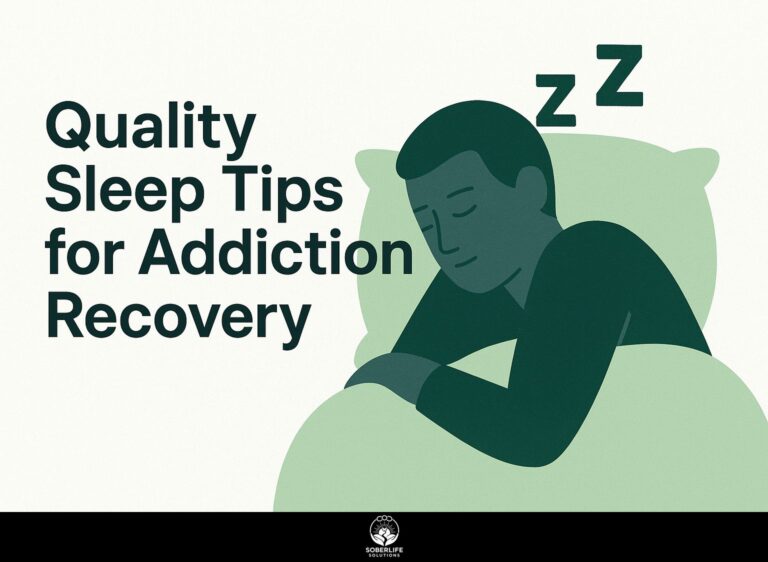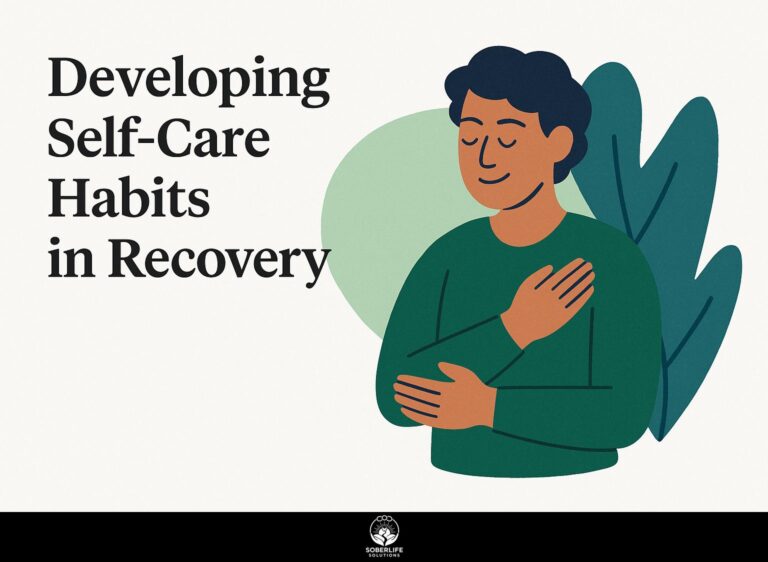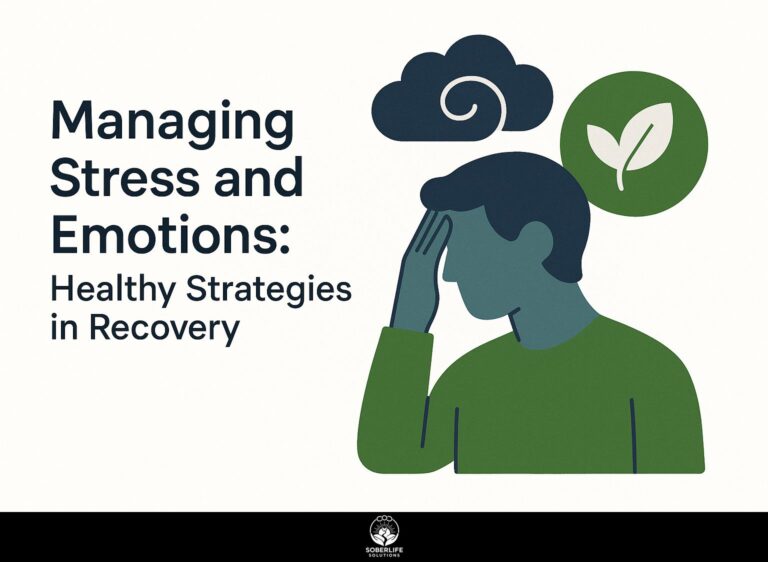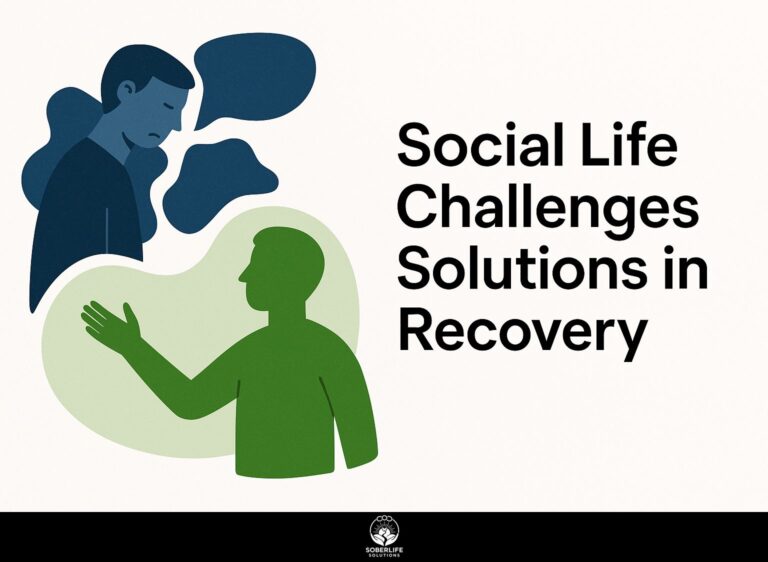Recovery Techniques: Mindfulness, Meditation, and Stress Reduction
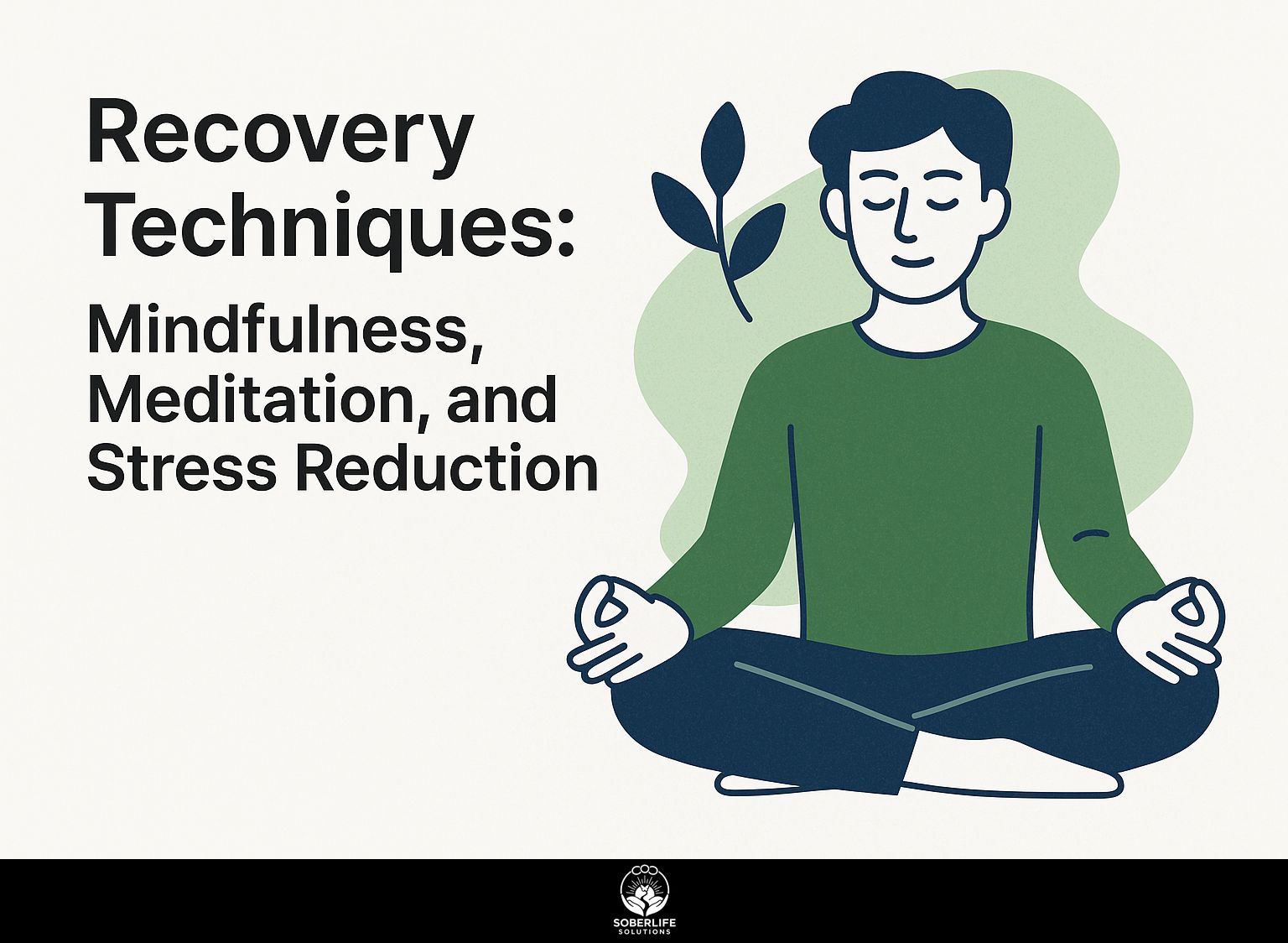
Struggling with substance use disorders (SUD) can feel overwhelming, but effective recovery techniques like mindfulness training and meditation offer hope. These practices improve thinking skills and help prevent relapses. By including mindfulness and stress reduction methods in everyday life, people facing addiction can build strength and improve their health. In this article, we’ll look at important recovery techniques that can change your path to healing and a better state of mind.
Key Takeaways:
Importance of Recovery in Daily Life
Incorporating recovery techniques into daily routines can significantly reduce health care costs associated with substance use disorders, with studies showing a 30% drop in relapse rates.
Daily recovery habits like mindfulness meditation, journaling, and exercise are important for staying sober and improving mental health.
For instance, mindfulness meditation has been linked to improved emotional regulation and reduced craving. A study from the National Survey on Drug Use and Health found that participants engaging in mindfulness reported 40% better coping mechanisms compared to those who didn’t. SAMHSA, the organization behind this survey, provides key insights into the effectiveness of various recovery techniques.
In the same way, regular exercise boosts physical health and improves mood, making it a helpful way to avoid relapse.
Sticking to these habits can help you lead a stable life and support lasting recovery.
Understanding Mindfulness
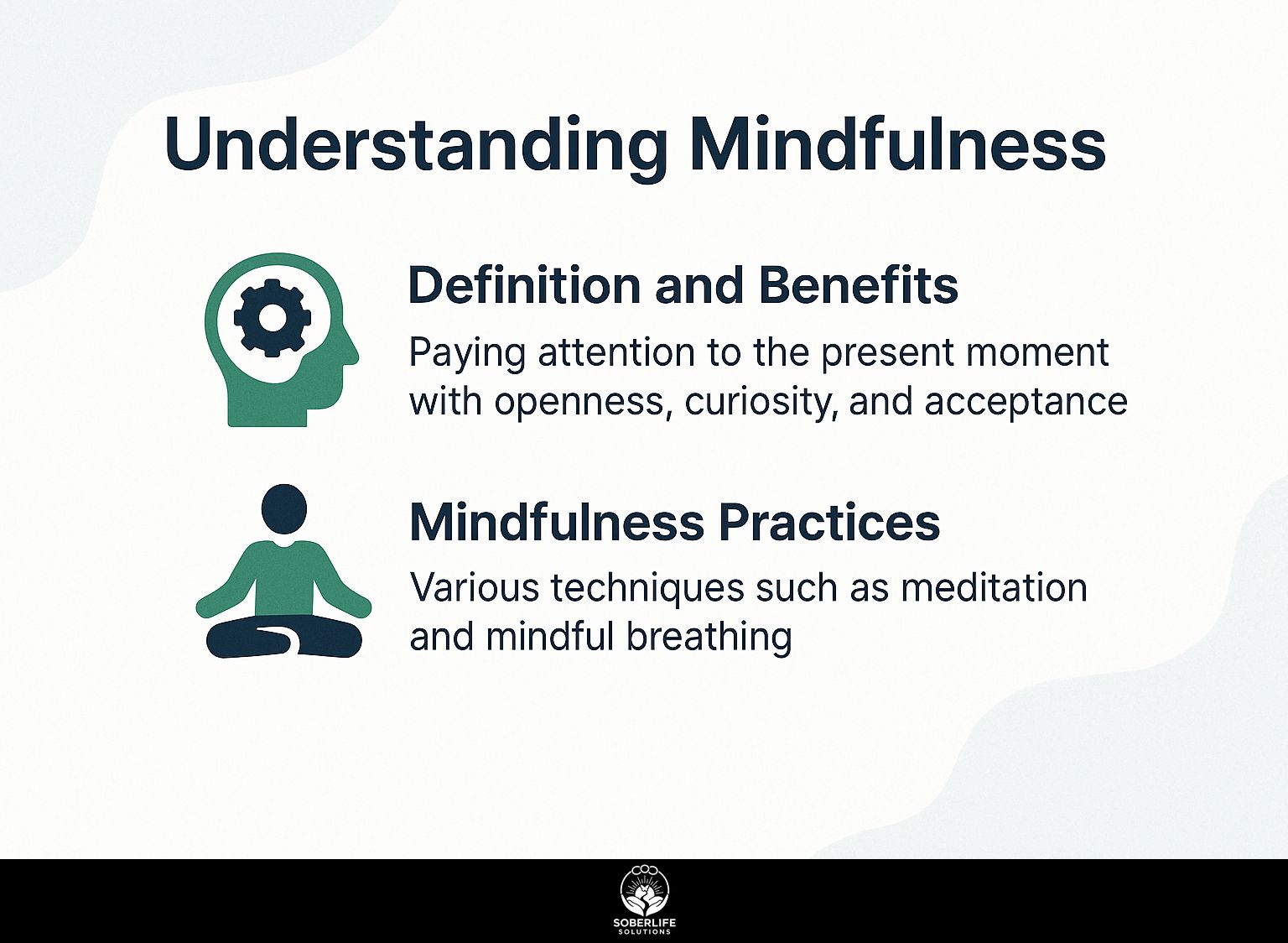
Mindfulness means paying attention to what is happening right now. This is important for handling urges and emotional responses during recovery. For those looking to deepen their practice, our insights on living mindfully every day offer practical guidance.
Definition and Benefits
Mindfulness meditation, a core component of mindfulness-based interventions, has been shown to reduce cravings by up to 60% in individuals with alcohol use disorder.
Research led by the National Institute on Drug Abuse indicates that mindfulness practices improve emotional regulation and decrease impulsivity. This is important for people who are recovering.
Techniques such as focused breathing exercises, body scans, and loving-kindness meditation can be integrated into daily routines. For example, allocating just 10 minutes each morning for deep breathing can significantly manage stress levels.
Apps such as Headspace or Calm offer guided sessions specifically created for addiction recovery, helping users bring mindfulness into their daily routines. These approaches are supported by research conducted at the University of Washington, which highlights the effectiveness of mindful body awareness training in preventing relapse – a conclusion supported by extensive University of Washington research.
Mindfulness Practices
Practicing mindfulness can involve different approaches, such as Mindfulness-Based Stress Reduction (MBSR) and Mindfulness-Based Cognitive Therapy (MBCT), each meant to build awareness.
Both MBSR and MBCT emphasize different methods for achieving mindfulness. For example, MBSR uses methods like body scans and guided meditations, which you can do for 10-30 minutes daily.
Apps like Headspace or Insight Timer provide guided activities.
In contrast, MBCT often focuses on awareness of thought patterns, encouraging journaling or mindful reflection.
Integrate these techniques into your routine by setting aside time each morning or evening to practice, helping you develop a consistent mindfulness habit.
Meditation Techniques
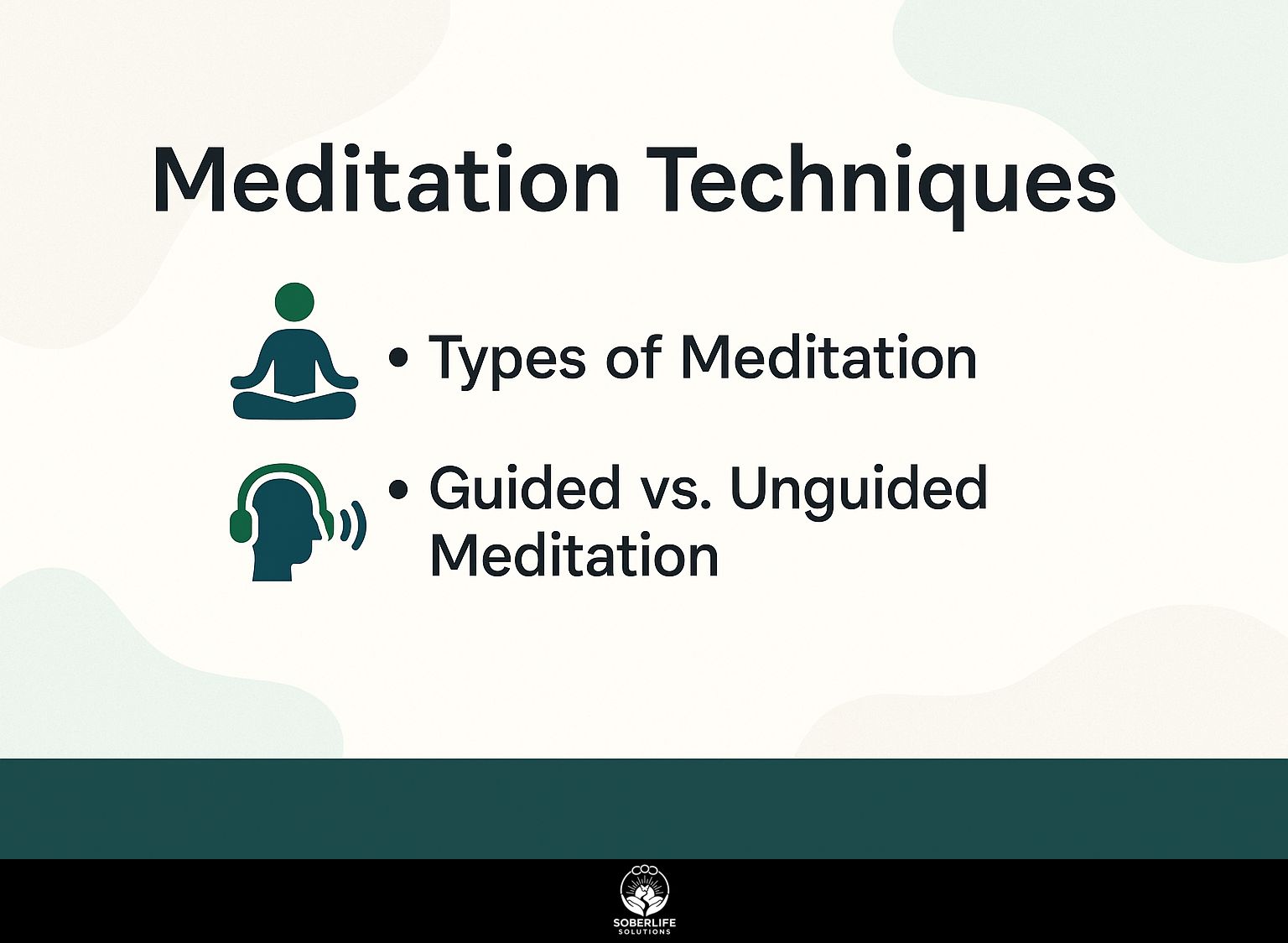
There are many meditation techniques, both guided and unguided, that suit different preferences and help with recovery. To complement these practices, see also how breathing exercises can effectively manage urges.
Types of Meditation
Key types of meditation include mindfulness meditation, which involves focusing on the present moment, and loving-kindness meditation, which encourages compassion and forgiveness.
Both practices can be particularly beneficial in addiction recovery. Mindfulness meditation allows individuals to observe their cravings and triggers without judgment, helping to reduce impulsive reactions.
Spending 10 minutes daily on focused breathing can improve your awareness of yourself. On the other hand, loving-kindness meditation, where one silently wishes well for oneself and others, promotes self-acceptance and emotional resilience.
Incorporating these practices into a daily routine, perhaps through guided apps like Headspace or Calm, can create a supportive environment for recovery.
Guided vs. Unguided Meditation
Guided meditation typically involves audio or video directions, while unguided meditation allows for personal exploration, each offering unique advantages for recovery.
Guided meditation, such as sessions offered by apps like Headspace ($12.99/month) or Calm ($14.99/month), is ideal for beginners who appreciate structured support. These tools give clear guidance in steps and can improve concentration, which is especially helpful for people experiencing anxiety.
Unguided meditation lets you reflect and grow on your own, which is great for people with more experience or specific needs.
To determine which method is right for you, consider your anxiety levels and experience with meditation. Using both methods can help you find a balance that aids your recovery process.
Stress Reduction Strategies
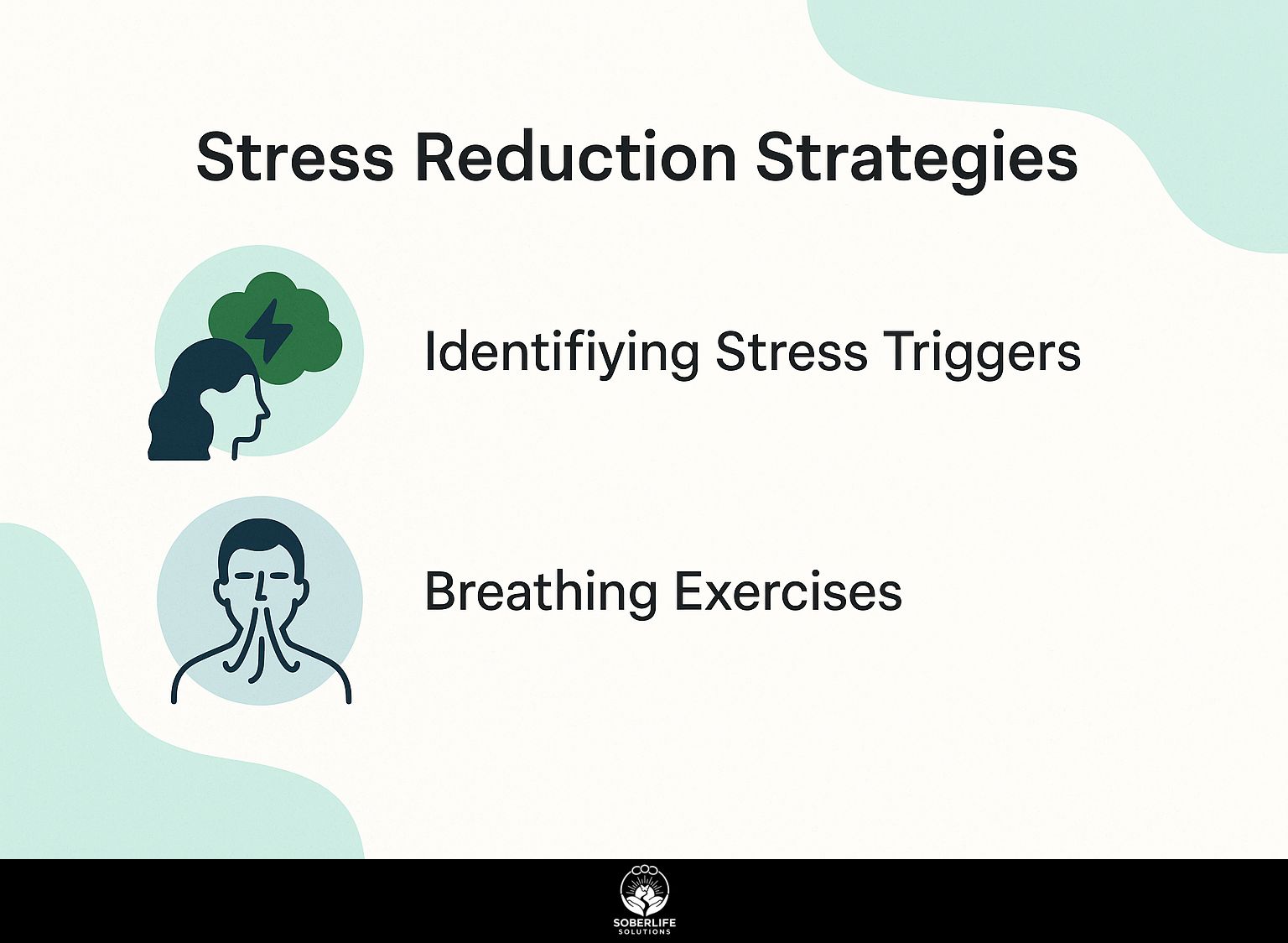
Effective ways to reduce stress are important in recovery because handling stress can stop relapse and improve overall health. One approach that aligns with these goals is mindfulness and meditation, which offer significant techniques and benefits in addiction recovery. For those interested in exploring this further, our insights on Mindfulness and Meditation in Addiction Recovery provide valuable strategies to incorporate into your stress reduction plan.
Identifying Stress Triggers
Finding what causes stress is important because people can feel up to 40% more cravings when faced with familiar stress factors.
To pinpoint personal stress triggers effectively, start with daily journaling. Document your emotions and stress levels, noting specific situations that lead to heightened anxiety or cravings.
Complement this with tools like MyTherapy, a free app that helps track your stress along with any related habits. Think about your week regularly; if you feel more stressed when deadlines approach, think about ways to manage your time better.
Practice mindfulness techniques such as deep breathing or meditation, which can help mitigate responses to identified triggers.
Breathing Exercises
Breathing exercises, such as the 4-7-8 technique, can significantly lower stress, providing a simple and helpful choice for recovery.
To practice the 4-7-8 technique, follow these steps:
- Inhale deeply through your nose for 4 seconds.
- Hold your breath for 7 seconds.
- Exhale slowly through your mouth for 8 seconds.
Repeat this cycle four times. Research from Harvard shows that controlling your breathing can calm the nervous system and improve mindfulness, which can help reduce anxiety. As Harvard Business Review highlights, effective breathing techniques like these are a key strategy in stress reduction.
Incorporating this exercise into your daily routine, especially before stressful situations, can yield lasting benefits for mental clarity and emotional stability.
Integrating Techniques into Daily Routine
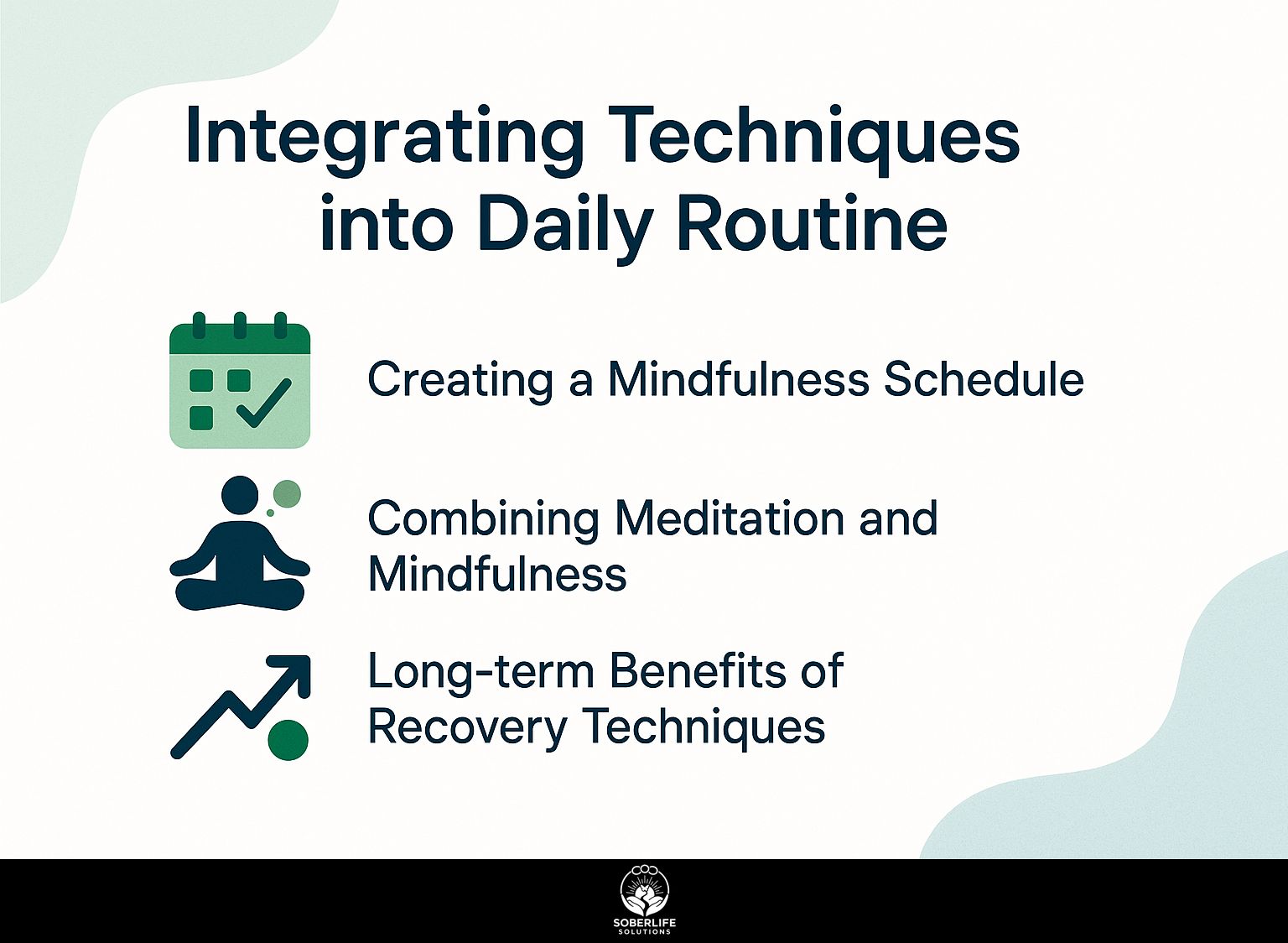
Including recovery techniques in your daily schedule makes them more effective, encouraging lasting commitment and strength to prevent relapse. Techniques like mindfulness and meditation can be particularly beneficial (see our Mindfulness and Meditation: Techniques and Benefits in Addiction Recovery for more insights).
Creating a Mindfulness Schedule
Setting aside 10-20 minutes each day for a mindfulness routine can improve emotional control and support recovery efforts.
To create your mindfulness schedule, start by identifying specific times for various practices.
- For example, dedicate 10 minutes each morning at 7:00 AM for meditation, followed by 5 minutes of reflection at 7:15 AM.
- Consider a midday coping exercise around 12:30 PM, utilizing breathing techniques or a quick walk.
To improve your routine, use Google Calendar to create alerts, helping you stay consistent and responsible. This organized method can help you better understand your thoughts and feelings, supporting your path to recovery.
Combining Meditation and Mindfulness
Mixing meditation with mindfulness methods can form a strong overall strategy, dealing with both emotional and mental parts of healing.
For instance, practicing daily meditation for 10-20 minutes can help center your thoughts, while participating in a weekly mindfulness retreat can deepen this experience.
Tools such as the Headspace app can guide your daily sessions, ensuring structured practice. At the Insight Meditation Society, you can join retreats that help you get better at being mindful.
By alternating these practices, people often report clearer thinking, reduced anxiety, and improved emotional control, making it easier to manage daily challenges.
Long-term Benefits of Recovery Techniques
Research shows that using recovery methods can significantly help mental health, leading to a 50% decrease in relapse rates over multiple years.
Incorporating mindfulness and meditation into your routine can fundamentally change your life. For example, spending just 10 minutes each day on guided meditation apps like Headspace or Calm can help you become more aware and lower stress levels.
Research indicates that participants practicing mindfulness report lower anxiety levels and improved emotional regulation. Joining weekly mindfulness groups can help you stay responsible and get support from others.
By regularly using these methods, you deal with current problems and also strengthen your ability to recover and improve your overall health in the long run.
Frequently Asked Questions
What is mindfulness and how does it help with stress reduction?
Mindfulness is the practice of being fully present and aware of our thoughts, feelings, and surroundings in the present moment. It helps with stress reduction by allowing us to observe and acknowledge our thoughts without judgement, which can help reduce anxiety and overwhelm.
What are some simple mindfulness exercises I can do to reduce stress?
Deep breathing, body scanning, and mindful walking are all simple mindfulness exercises that can help reduce stress. These activities can help bring our attention to the present moment and help us feel more calm and centered.
How does meditation contribute to recovery and stress reduction?
Meditation is an effective method for healing and reducing stress. It helps us find peace and calmness by directing our thoughts to the present. It can also help reduce stress by promoting relaxation and reducing the physiological effects of stress on our bodies.
Can anyone learn mindfulness and meditation, or is it necessary to have special skills?
Mindfulness and meditation can be practiced by anyone, no matter how experienced they are. This practice can be adjusted to fit personal needs and likes, making it good for anyone wanting to lower stress and improve health.
How can I include mindfulness and meditation in my daily activities?
You can make mindfulness and meditation part of your daily routine by choosing a specific time each day to practice, whether it’s in the morning or before bed. You can also include mindfulness in your daily routine, like eating mindfully or taking mindful breaks during the day.
What are the benefits of incorporating mindfulness, meditation, and stress reduction techniques into my recovery process?
Adding mindfulness, meditation, and methods to lower stress into your recovery process can help you in many ways, like lowering stress and anxiety, better control of emotions, greater self-awareness, and improved overall health. These practices can also help support long-term recovery by promoting self-care and self-compassion.

